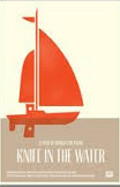
Directed by
Roman Polanski
94 minutes
Rated M
Reviewed by
Bernard Hemingway

Knife In The Water
Roman Polanski’s first film, the only feature he made in his home country before emigrating to France is an strikingly spare study of the dynamics of power in human relationships.
Andrzej (Leon Niemczyk) and Krystyna (Jolanta Umecka) are a well-to-do couple on their way to a lake where they plan to go boating. En route they pick up a student hitchhiker (Zygmunt Malanowicz) who stops their car by standing in the middle of the road). With Krystyna as witness the two males almost immediately commence a sexually-charged power game that gradually escalates over the course of a day and a night after Andrzej invites the hitchhiker to join them sailing.
There is little going on in terms of plot and the dialogue by Polanski and his co-screenwriter, Jerzy Skolimowski (who would go on to direct the iconic 1970 English suburban tragedy, Deep End), is quite banal but Polanski makes marvellous use of a purely visual language to evoke the dangerous dynamics of the relationship between the two men and the woman in their hermetic world. Although events presumably take place in summer, Jerzy Lipman’s black and white photography gives the film a starkly chill look that is eminently suited to Polanski’s and Skolimowski's clinical dissection of human relations. Combine this with the hip jazz score and the film amply qualifies as a classic of the anti-establishmentarian era.
Whilst it is somewhat distracting that Malanowicz who was in his mid-twenties looks far too old to play the role of a “kid” (Polanski intended to play the part himself but was denied the role by his state-funded producers but he managed to dub his own voice for that of Malanowicz) and there are the occasional clumsy takes, Polanski's Oscar-nominated debut is an impressive calling card that looks forward to many of the themes of the director's subsequent career (most explicitly with 1966’s Cul-De-Sac).
Want something different?





